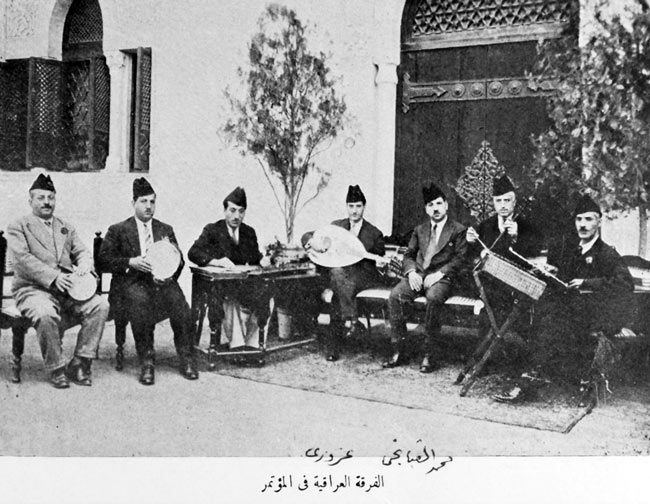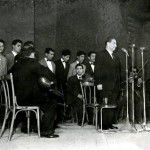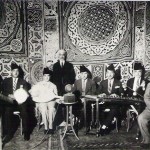The Arab Music Archiving and Research foundation (AMAR), in collaboration with the Sharjah Art Foundation (SAF), presents “Min al-Tārīkh”.
Dear listeners,
Welcome to a new episode of “Min al-Tārīkh”.
Today we will resume our discussion about al-ṭarīqa al-Qubbāngiyya and its founder Muḥammad al-Qubbāngī with our guest Mr. Husayn al-A‘zami.
Muḥammad al-Qubbāngī travelled to Germany where he mingled with Tunisian and non-Tunisian artists, went back to Iraq, then travelled again in 1932 to Cairo where he stayed for a few months after the Congress. He returned to Iraq in 1933 along with Egyptian artists including Sāmī al-Shawwā, Umm Kulthūm, and ‘Abd al-Wahāb. What happened at that time?
Mr. Mustafa, it seems to me that al-Qubbāngī was still in Cairo when Umm Kulthūm reached Baghdad where she stayed for a while: she arrived there in 1932 and not in 1933, and thus before him. Many Egyptian singers lived and worked in Baghdad for a long period of time, including Muḥammad ‘Abd al-Wahāb, and Muḥammad ‘Abd al-Muṭṭalib who also worked there a lot as well as in Mawṣil, added to many other Arab singers –muṭrib-s and muṭriba-s– from Lebanon and Syria who became professional singers in Iraq then went back to their country.
Al-Qubbāngī’s art was inspired by some of these cultures, wasn’t it?
Of course it was! In fact, the major turning point was the 1932 Cairo Congress because he caught everybody’s attention with his strong and expressive voice added to his capabilities. He made many recordings, including his best recording made in Cairo. I have mentioned in my book about al-Qubbāngī that if he had only recorded the maqām manṣūrī “Kayfa yaqwa ‘ala al-jafā mustahāmu”, this one and only recording would have been enough to immortalize him throughout history. He recorded it in Cairo and it is among the most beautiful and expressive as well as the most difficult maqām-s: incredibly dense with moving expressions. I have stated that the maqām manṣūrī specifically –while the following can be applied to all Iraqi maqām-s, but the maqām manṣūrī more than others– expresses or represents the story of Iraqis and their tragedies throughout history: it is a fifteen minutes digest of Iraq’s full history interpreted through his performance expressions …
(♩)
Muḥammad al-Qubbāngī’s interpretation of many maqām-s represents a major turning point, and most importantly his romantic ṭarīqa overflowing with change and novelties, that will remain forever, knowing that everything new will be necessarily derived from its core as it is the root of the modernism that went, for the first time, beyond its existing frame.
Concerning the 1932 recordings, there is a strange recording of an abudhiyya “Khudh al-‘aysh wa-ighnum min zamānak” that he sang a cappella accompanied by the ensemble who gave him the measure with their voice, such as in …
(♩)
Is this a maqām?
No, this is a poetry form added to an “abudhiyya”: a literary poem of 2, 3, or 4 verses –as many as you like–; and the abudhiyya is a popular poem formed by 4 hemistiches that convey the same meaning as the literary verses. The abudhiyya is a type of popular poem with 4 hemistiches, the first three ending with a jinās (paronomasia: one same word with different meanings), and the fourth whose last word ends with “yat” such as “al-a‘ẓamiyyat”, “al-waṭiyyat”, “suwiyyat”… etc.
Here is an example of an abudhiyya …
(♩)
This was an example of a poem with an abudhiyya.
It is not a maqām.
No, it is not a maqām. It can be played to the bayyāt, to the ṣabā, or to any other scale… etc.
It sounds like religious inshād (chanting), or even like sad chanting (mourning)…
Yes. It can be sad. Note that it is also performed in sad “manqaba nabawiyya sharīfa” (the Noble Virtues of the Prophet).
(♩)
Dear listeners,
We have reached the end of today’s episode of “Min al-Tārīkh”.
We thank Mr. Husayn al-A‘zami as well as all those who helped collect the recordings that were broadcasted during this episode.
We will meet again in a new episode to resume our discussion about al-ṭarīqa al-Qubbāngiyya and its founder Mr. Muḥammad al-Qubbāngī.
“Min al-Tārīkh” is brought to you by Mustafa Said.
- 221 – Zakariyya Ahmed – 12 (1/9/2022)
- 220 – Zakariyya Ahmed – 11 (1/9/2022)
- 219 – Zakariyya Ahmed – 10 (11/25/2021)
- 218 – Zakariyya Ahmed – 9 (10/26/2021)
- 217 – Zakariyya Ahmed – 8 (9/24/2021)
- 216 – Zakariyya Ahmed – 7 (9/4/2021)
- 215 – Zakariyya Ahmed – 6 (8/28/2021)
- 214 – Zakariyya Ahmed – 5 (8/6/2021)
- 213 – Zakariyya Ahmed – 4 (6/26/2021)
- 212 – Zakariyya Ahmed – 3 (5/27/2021)
- 211 – Zakariyya Ahmed – 2 (5/1/2021)
- 210 – Zakariyya Ahmed – 1 (4/28/2021)
- 209 – W-al-Lāhi lā astaṭī‘u ṣaddak 2 (4/6/2017)
- 208 – W-al-Lāhi lā astaṭī‘u ṣaddak 1 (3/30/2017)
- 207 – Bashraf qarah baṭāq 7 (3/23/2017)



